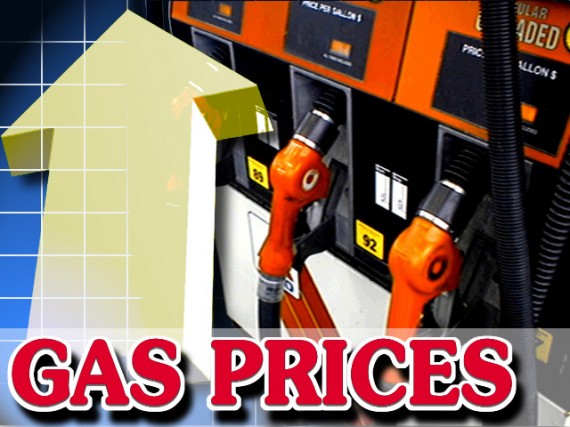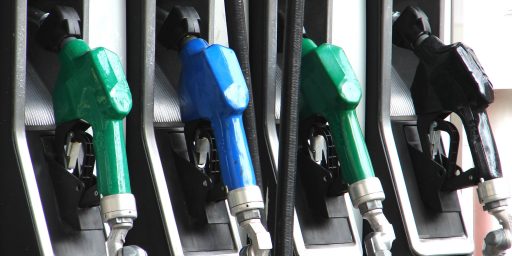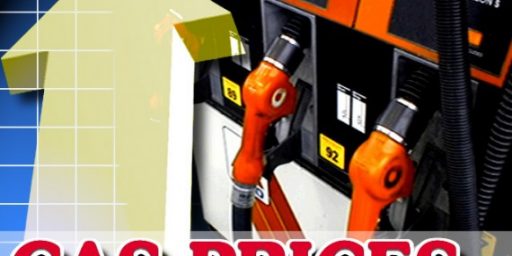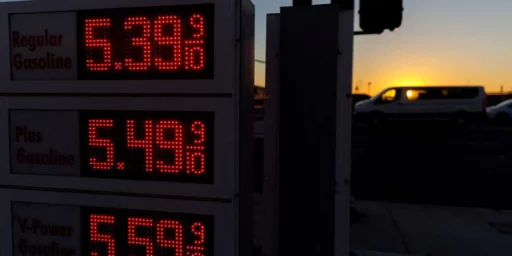So Much For The Summer Of $5.00 Gas
Back in May, it looked like gasoline prices had nowhere to go but up, but that was then and this is now:
Call it an Independence Day discount.
Gasoline prices usually peak in the summer. This year, however, they peaked a little earlier, on May 5. The subsequent slide has made gas about 24 cents per gallon cheaper than it was on Memorial Day.
The national average now stands at $3.55 per gallon. That’s the cheapest gasoline has been since late March. Tom Kloza, publisher and chief oil analyst at Oil Price Information Service, expects the national average to drop another 25 to 30 cents per gallon this year.
“Prices will be lower until we get to hurricane season, then who knows?” Kloza said.
A reminder, perhaps, that the ways things are isn’t necessarily the way they are always going to be.






As this chart shows, the summer peak hasn’t really been that regular.
Gas prices have been on a random, somewhat upward, walk. As I understand it the upward driver is “more rapid than expected” emerging market demand. This demand has grown faster than production capacity. Whenever those markets, or the world economy in general, look up, prices rise in expectation of that new demand. Now, with hope of a clear recovery fading, with a soft spot in the US economy, Chinese uncertainty, and of course the Greek crisis, demand hopes fade, prices fall.
This is all thoroughly unpredictable. Well. the safe bet is that we’ll see $5 someday. Anyone who tells you when is telling you how they feel about global economic conditions.
Hurricane season has already arrived. It started June 1st.
“Prices will be lower until we get to hurricane season, then who knows?”
I know. For a small fee to cover expenses I will share my wisdom!
N
Do you notice that Kloza says “who knows?” but also gives a very specific prediction,? He “expects the national average to drop another 25 to 30 cents per gallon this year.”
This is the dual attitude that Nassim Taleb gets so much mileage lampooning – as well he should. No one sane could possibly give a precise prediction, and then in the next sentence say “who knows?” It should be one or the other. Yet there are entire predictive industries built on this kind of nonsense.
.. don’t forget to tune in to financial TV for this year’s closing Dow …
This is roughly the pattern expected by Peak Oil Theory, a series of economic shocks resembling descending stairs. A number of people have noted the american economy has entered recession
every time fuel costs have risen to 4% GDP or higher.
I’ve been convinced record high fuel prices in 2008 was the primary trigger for the financial crisis; the additional economic drain causes increased job and wage loss among americans least able to afford it, resulting in a sudden increase in the number of borrowers unable to keep up with mortgage payments. That in turn exposed the big banks to the consequences of the massive overleveraging they’d been engaged in.
Last year we saw a false-recovery which generated positive returns on GDP but had almost no impact on any part of the economy outside finance. Oil prices began to rise again coming close to the 2008 peak, and the economy entered recession again before that could happen a
This may be the pattern for the next few decades.
“Trigger” is a tricky word, Ben. Hard core Peak Oilers see the economic crisis as purely energy based, ignoring the credit and housing bubbles entirely.
If you ask me it’s possible that oil prices were one of the triggers, but I don’t really see them as entirely separable from the economic cycle. Credit fueled inflation in certain categories, including energy. When the bubble stretched too tight, it popped.
Compare this to say a pure energy scenario, one in which credit and housing prices were intact … we’d have something more like the 70’s and 80’s fuel crises, when people downsized cars, upsized MPG, and continued on …
They couldn’t do that this time because they were strung out in other ways.
High oil prices seem to be associated with recession. Economist James Hamilton wrote an academic paper showing that in the United States, 10 out of 11 recessions were preceded by oil price spikes.
Oil prices can’t go very high, because of this connection with recession. This is essentially the limiting factor in getting oil out of the ground. There is a lot of oil there. The problem is that we can’t get the price high enough to get to it. See my post “There is plenty of oil, but . . .”
I also wrote an academic paper, “Oil Supply Limits and the Continuing Financial Crisis“.
I think, Gail, that the problem is superposition of signals. Peak Oil operates on a scale of decades, while recessions operate on a somewhat shorter scale:
If I had to place a bet, I’d say we were at or near peak oil, but it’s hard to care, when the economic cycle is so much more violent and so much more immediate.
That, and I’ve got my Prius.
@john personna:
I’m jealous.
Never mind the governments have released millions of barrels of stragetic reserve oil that lowered prices and a possible Greek default that would have been another financial crisis at the door.
I had actually forgotten the international agreement to free strategic reserves. Good point.
I think nations realized that to the extent that they bid against each other to fill reserves, it was counter-productive.
Nice ride…
The price of gas is generally going up over time. The dip is a blip in the larger upward trend.
The US EIA: The EIA sees the price of West Texas Intermediate (WTI) crude oil averaging around $93 per barrel in 2011, $14 over the 2010 average.
Price per barrel is $96 and change now.
If you look at historic trends though, the price is up, with dips:
http://www.evsroll.com/History_of_crude_oil_prices.html
EVsRock!